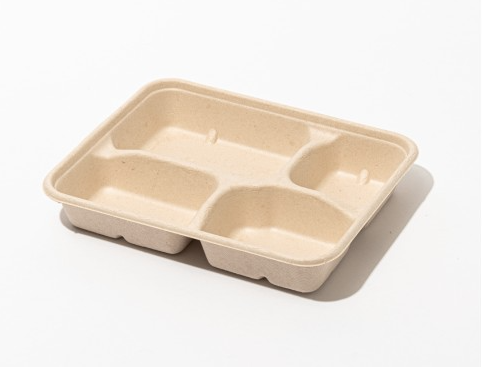¿Qué depara el futuro a los envases de alimentos fabricados a partir de pulpa de caña de azúcar (pulpa moldeada)?
Con la implementación de la prohibición del plástico, han surgido diversos tipos de vajilla ecológica, pero su calidad varía considerablemente. Algunas empresas afirman que sus productos son ecológicos, pero aun así incluyen materiales no biodegradables, lo que induce a error a los consumidores. En este contexto, la pulpa de caña de azúcar y la pulpa de bambú se consideran sustitutos ideales del plástico. Además, la promoción de... Libre de PFAS productos está cobrando impulso. Exploremos el desarrollo futuro de Envases para alimentos hechos de pulpa de caña de azúcar (pulpa moldeada).

Productos de pulpa moldeada biodegradables
En comparación con materias primas como la pulpa de papel usada o las fibras recicladas de trigo, caña, paja de arroz, bambú, caña de azúcar y palma, que se obtienen ampliamente, la pulpa de caña de azúcar es un material fibroso natural y altamente concentrado. Los productos elaborados con pulpa de caña de azúcar pueden degradarse completamente en condiciones naturales en 90 días y son aptos tanto para el compostaje doméstico como industrial. Los principales componentes del material degradado son agua y dióxido de carbono, sin dejar residuos ni contaminación ambiental. Por el contrario, la vajilla de plástico no biodegradable libera sustancias nocivas, contaminando el medio ambiente y perjudicando la salud humana.
En concreto, la tecnología de moldeo de pulpa de caña de azúcar se ha aplicado ampliamente en productos como: platos de caña de azúcar, Ecológico Cuencos biodegradables de bagazo de caña de azúcar Para sopa, ensalada, postre, helado y Bandejas de comida desechables. Por ejemplo, placas de pulpa de caña de azúcar No solo son duraderas, sino que también ayudan a reducir el impacto ambiental. Las bandejas con divisiones, especialmente útiles para servir diferentes tipos de comida, se usan comúnmente en escuelas, restaurantes y servicios de comida para llevar. Estos productos, fabricados con tecnología de pulpa moldeada, son ecológicos y prácticos.
Productos plásticos biodegradables
Materiales como el PLA, el PBAT y el PHA, considerados plásticos biodegradables, han sustituido parcialmente a los plásticos tradicionales no biodegradables. Sin embargo, estos materiales tienen un alto coste de producción y están sujetos a rigurosas condiciones de degradación natural. Por ejemplo, los cuencos de PLA pueden degradarse más lentamente de lo esperado en condiciones naturales, lo que pone en riesgo su eficacia como materiales ecológicos.
Productos plásticos no biodegradables
Materiales como PP, PE y PET están explícitamente restringidos por la prohibición del plástico. Estos plásticos se utilizan tradicionalmente en artículos como mangos de ollas arroceras, tuberías y revestimientos de cables, pero no son aptos para la vajilla. La quema de estos plásticos contamina el medio ambiente y supone riesgos para la salud, razón por la cual se ha implementado la prohibición del plástico.
El gobierno ha prohibido explícitamente la vajilla de plástico no biodegradable, y se requieren más medidas en este ámbito. Si bien nuevos materiales como el PLA están ganando popularidad, muchas empresas informan de costos más elevados.
En comparación con el PLA, el PBAT y otros nuevos materiales ecológicos, las pulpas de caña de azúcar y bambú no solo son más rentables, sino que también se prevé que sean más económicas a medida que la producción aumente y la demanda del mercado. En el futuro, es probable que la pulpa de caña de azúcar se convierta en una de las principales alternativas al plástico, especialmente en aplicaciones como platos, cuencos y bandejas divididas, lo que impulsará el desarrollo de vajillas ecológicas.